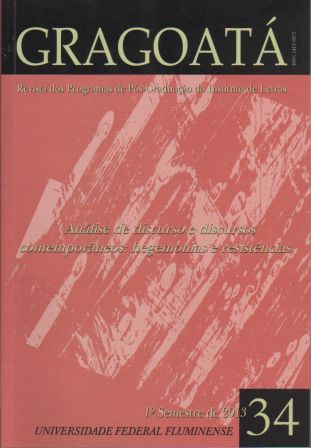A small Guinean family: a discursive approach of the historical continuity in a discourse for the independence
DOI:
https://doi.org/10.22409/gragoata.v18i34.32975Keywords:
small family, independency, Equatorial Guinea, Discourse Analysis, HispanicityAbstract
The purpose of this work is to analyze the official speech given by a Spanish authority, representative of the dictator Francisco Franco, in October 12 of 1968, which was related to the independency of the Equatorial Guinea. This pronouncement is part of major research proposed to explicit the notion of Hispanicity. October the 12th, day of the arrival of Christopher Colombus in America, also known as the “discovery” of America, was chosen by Guinean authorities of the time to celebrate the independency of the new African nation. An additional peculiarity of the Equatorial Guinea is its uniqueness as the only African nation to have Spanish as the main official language. Guided by the dialogical bakthinian vision, we adopt as our theoretical standpoint the Discourse Analysis (DA), which takes into account enunciative studies. We observe a net of identity affiliations that is interweaved between the Mother Nation and the African ex-colony. The subjective instance that is manifested in an exaltation tone is in concordance with a historical continuism with respect to the Spanish language and the moral values steeped by the Christian religion. This is mostly observed in the rewriting of the process of Spanish colonization.Downloads
Downloads
Published
How to Cite
Issue
Section
License
Authors who publish in Gragoatá agree to the following terms:
The authors retain the rights and give the journal the right to the first publication, simultaneously subject to a Creative Commons license CC-BY-NC 4.0, which allows sharing by third parties with due mention to the author and the first publication by Gragoatá.
Authors may enter into additional and separate contractual arrangements for the non-exclusive distribution of the published version of the work (for example, posting it in an institutional repository or publishing it in a book), with recognition of its initial publication in Gragoatá.

Gragoatá is licensed under a Creative Commons - Attribution-NonCommercial 4.0 International.














